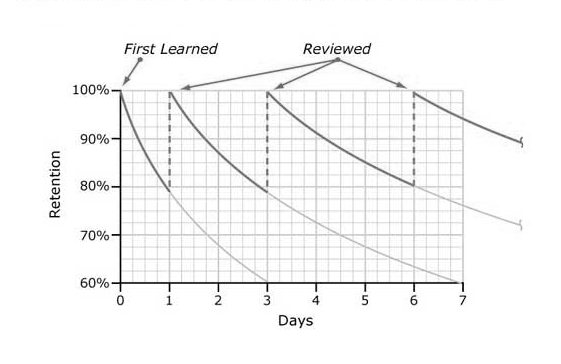The Secret to Proper Revision
Hi everyone!
One of the most effective studying improvements that students can make is implementing a solid revision schedule. Many students are familiar with the concept of revising, but often don’t have a proper system that allows them to remember content.
In this newsletter we’ll discuss:
- Why a revision system is the key to strong exam performance.
- The three pillars of a revision system
- How to implement a simple revision system to your studying
1. Why should I care about revision anyway?
Revision is essential to promote long term understanding of content. Many of you may be familiar with the Ebbinghaus forgetting curve, which illustrates that you will inevitably forget things if you don’t review them.
 |
As you can see above, revision is important to interrupt the forgetting curve and to lengthen your memory of knowledge.
When done properly, revision has the ability to dramatically increase your depth of knowledge and understanding of any particular topic. Ideally, you should revise everything you learn.
2. The pillars of effective revision:
Effective revision has 3 main components: spacing, interleaving and retrieval. Each of these concepts are simple, but understanding their application is the key to building your own revision schedule.
Spacing - increasing the time between each separate revision session.
Retrieval - recalling content that you have learnt from memory. This can be cued (e.g flashcards or reading your notes before revising) or full (completely from memory).
Interleaving - changing the way that you study a topic each time you revise it.
3. How can I implement a revision strategy?
An effective revision strategy integrates all of the three pillars mentioned above. This means increasing the amount of time between each review of a topic, ensuring that all revision is done with true/full recall and that interleaving is used each time.
A good spacing schedule is 1 day, 1 week, 1 month, 2 months. Interleaving can involve creating practice questions, creating a 1 page summary, teaching an imaginary student or doing practice questions.
For an example of how I implement a revision strategy in my life, this is what I did for some conditions I studied on the 16th of May.
- 16th May - studied the conditions independently
- 1 day after (17th May) - created a MM from memory based on what I learnt.
- 1 week after (3rd June) - pretended to teach an imaginary student
- 1 month after (2nd August) - created clinical scenarios based on the conditions.
As you can see, I haven't followed the spacing exactly, but my system means that I forget much less of the stuff that I’ve been learning over time.
Revision is truly one of the best techniques to improve your grades when it is applied properly. Have a go and see how it works for you!
Emil
My Progress:
YouTube subscribers: 9,800
Newsletter subscribers: 185
YouTube revenue last week: $240.55
Welcome to Emil's Emails!
Sign up for my weekly newsletter where I share exclusive productivity tips, useful life advice and insights from my life as a medical student in Australia.
In the video that I posted last week, I talked about a method of doing practice questions that allows you to learn more from practice questions to get better marks. This involves a bit more initial work. You need to mark every question with a confidence score and review each of the questions with low confidence so that your confidence improves over time. You invest some time studying the topic of the questions you don’t know much about, and that enables you to improve your knowledge and...
Hey everyone! Perfectionism is a silent killer, but there are several ways to break through it. The signs of perfectionism are often insidious and easily missed. They can manifest in every aspect of your life, and can lead to feelings of stagnation In this newsletter I’ll share how I recognise perfectionism in my life and some strategies to overcome it. In medicine, I notice perfectionism the most when I’m targeting areas I know I’m weaker in, like metabolic derangements for example. I’ll...
Hey everyone, Happy Easter! I’ve been in a bit of a productivity rut recently. I have been slightly sick, quite busy and a bit behind on many different projects, meaning that I have felt quite overwhelmed. While preventing burnout is one of my core mantras, it’s sometimes inevitable that this happens. When it does, I think journaling is one of the most powerful techniques to help you escape a slump. I’ll explain why in this newsletter 👇 This morning, I sat down and decided that I needed to do...